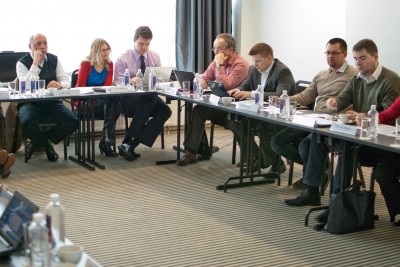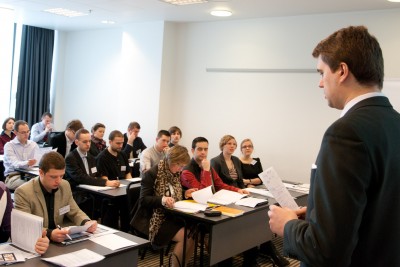Regular 4liberty.eu Think Tank meeting was hosted in Vilnius (Lithuania) on April 3-4, 2012. Representatives of 10 think tanks participated in the meeting to discuss joint projects and recent developments  in their institutes – The Lithuanian Free Market Institute, Republikon Institute (Hungary), FOR (Poland), Projekt Polska (Poland), Liberte! (Poland), Institute for Economic and Social Studies (Slovakia), The F. A. Hayek Foundation (Slovakia), Liberalni Institute (Czech Republic), Institute for Market Economy (Bulgaria) and Academy of Liberalism (Estonia). The meeting was organized by Friedrich Naumann Foundation.
in their institutes – The Lithuanian Free Market Institute, Republikon Institute (Hungary), FOR (Poland), Projekt Polska (Poland), Liberte! (Poland), Institute for Economic and Social Studies (Slovakia), The F. A. Hayek Foundation (Slovakia), Liberalni Institute (Czech Republic), Institute for Market Economy (Bulgaria) and Academy of Liberalism (Estonia). The meeting was organized by Friedrich Naumann Foundation.
First part of the meeting included comments on the recent political development. Latest political situation in Slovakia (where former Prime Minister Robert Fico won the elections) was analyzed by Richard Durana from INESS. Similarly, the latest political development in other countries was briefly discussed and all participating think tanks presented their positions towards these events as well as their recent activities and future plans.
Great deal of the meeting was devoted to discussing projects of the think tanks and their planned joint cooperation within the network. In the upcoming month several projects are due to be held in several countries: Facing deficits (organized by INESS) – an international conference to be held in May in Bratislava with several ministers as speakers; Social Liberal Policy – an international conference in November in Warsaw (organized by Liberte!) where policy recommendations on social policy in Poland will be presented; Successes and Failures of Liberals in Central and Eastern Europe – an international conference to be held in October in Budapest (organized by Republikon Institute); Budgetville (Liberalni Institute) – web based project using info-graphics for education of public on public finance; Digital Agenda in the 21st century (Projekt Polska) – best practice seminar on use of modern technologies in public administration.
Next Think Tanks meeting is scheduled for November 2012 in Warsaw.
European Think Tank School, a workshop organized by ELF with special emphasis put on the theme of building management capacities of Central Eastern European think tanks, was held in Vilnius on April 5-6, 2012. The project aimed at exchanging good practice, strengthening cooperation between think tanks and further networking.
 Think Tank School started with Susanne Hartig, Executive Director of the European Liberal Forum, giving short introduction about ELF itself – organization founded in 2007, currently consisting of 35 member organizations. Introduction session by Zilvinas Silenas, President of LFMI, focused on the aim of the workshops. He underlined that all the participants should make every effort to become intellectual entrepreneurs. Introduction was followed by lectures by Corina Hendriks (Mr. Hans van Mierlo Stichting) and Richard Durana (INESS) explaining why the idea of liberty matters and how liberal agenda can possibly improve the future of Europe. Lithuanian Minister of Justice, Remigijus Simasius talked about current problems of Europe and danger of distant institutions making decisions affecting life of average people. Liberal think tanks should come up with a clear message and focus on law. Moreover, they should always seek to be efficient, authentic and not arrogant.
Think Tank School started with Susanne Hartig, Executive Director of the European Liberal Forum, giving short introduction about ELF itself – organization founded in 2007, currently consisting of 35 member organizations. Introduction session by Zilvinas Silenas, President of LFMI, focused on the aim of the workshops. He underlined that all the participants should make every effort to become intellectual entrepreneurs. Introduction was followed by lectures by Corina Hendriks (Mr. Hans van Mierlo Stichting) and Richard Durana (INESS) explaining why the idea of liberty matters and how liberal agenda can possibly improve the future of Europe. Lithuanian Minister of Justice, Remigijus Simasius talked about current problems of Europe and danger of distant institutions making decisions affecting life of average people. Liberal think tanks should come up with a clear message and focus on law. Moreover, they should always seek to be efficient, authentic and not arrogant.
In the second part of the workshops Svetla Kostadinova from IME and Richard Durana from INESS talked about efficient and successful running a think tank. They both emphasized the active approach, bottom-up activities and importance of cooperation with various partners. Practical workshops followed the lectures – participants were divided into 7 groups, each of which was assigned a topic related to current European problems. First groups had to come up with a potential project they would like to carry out and then create and present a communication strategy. Participants were supported by Matthew Elliot from Taxpayers Alliance (UK) who gave a lecture on how to create a communication strategy consisting of solid research, strategic communication and sustained campaign. Ruta Vainiene from LFMI spoke about communication strategy from a think tank’s perspective, putting emphasis on proactive attitude and innovation.
The last part of the Think Tank School, moderated by Tim Evans from the Cobden Centre (UK) and Edita Maslauskaite from LFMI, was devoted to fundraising. It was underlined that funding base has to diversified, think tank cannot be dependent on only one donor. Practical workshop followed – there were simulations of the fundraising meetings followed by remarks and tips for the successful fundraising.



